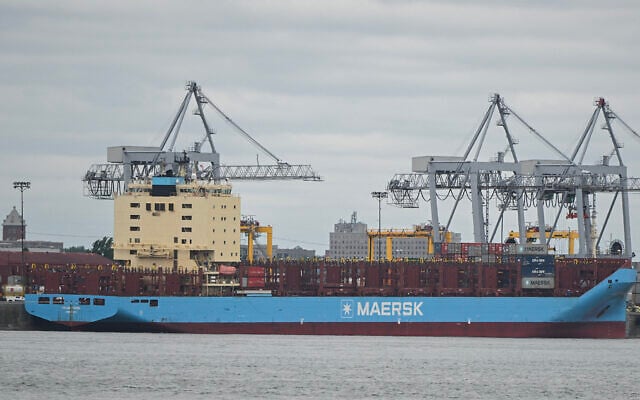


Located just 50 kilometers (31 miles) from Marseille in southern France, Marseille-Fos is one of the busiest ports in France, handling over 70 million tons of goods a year. In June, dock workers there were busy rummaging frantically through thousands of shipments to find small crates of links for rapid-fire bullet belts. The workers had received information that the crates would be loaded onto the Contship Era, bound for Haifa.
Since the French workers were unsure whether they would locate the pallets with the crates in time, the port’s union coordinated their action with their colleagues across the border in Italy’s Genoa port, where the ship was due to dock on its way to Israel. Should the French workers fail to locate the crates in time, their Italian counterparts would seek to prevent the shipment from reaching its destination in a show of cross-border coordination against arming Israel as it fights in Gaza.
The French port workers were also joined in the effort by the French legal organization JURDI, the Association of Jurists for the Respect of International Law, which petitioned a local court on the matter.
After being halted for several days at Marseille-Fos, the Contship Era was eventually forced to set off for Israel without the crates of bullet links. It is not clear what happened to the crates, but it appears that they were returned to the sender, Marseille-based company Eurolinks.
“Port workers refused to load the crates,” Alfonso Dorado, a lawyer for JURDI, told Shomrim. “This is our small victory.”
As international audiences grow more concerned about the humanitarian crisis in Gaza and are pushing their governments to do more to pressure Israel, they are also taking grassroots actions aimed at frustrating the war effort in whatever small ways possible. Beyond France, union workers in Italy, Greece, Belgium, Morocco, and Sweden have announced that they will act using the same method to halt military shipments bound for Israel.
These worker-led protests, along with arms embargoes from some countries and the risk of Houthi attacks disrupting Asian transport routes, are putting heavy pressure on Israel’s already strained supply chain — a complex system vital to Israel’s access to arms. Despite the country’s push toward self-reliance in manufacturing military supplies, any disruption to the delivery of even small parts can lead to prolonged delays, potentially carrying strategic consequences.
“While Israel is keen to downplay the importance of these protests, if the security services cannot get their hands on something very specific — and sometimes a tiny component they need can only be sourced overseas — this means they won’t have it when they need it,” said Eran Shamir-Borer, the director of the Center for National Security and Democracy at the Israel Democracy Institute.
“This leads to economic and operational ramifications,” he said. “Maybe they will have to start manufacturing the specific component in Israel; maybe that will be too expensive or will not be the same quality.”
Israel’s Defense Ministry declined a request for comment. The Foreign Ministry responded to Shomrim with a statement: “The issue is known and is being addressed with the relevant countries.”
Workers at Marseille-Fos began delaying shipments to Israel in April this year, when they examined a container suspected of carrying F-35 fighter jet components bound for Israel. The fate of that shipment is unknown — but following the incident, global maritime shipping giant Maersk, which operated the ship that was due to collect the cargo, announced that it would no longer use Marseille-Fos on some of its shipping lines.
A spokesperson for Maersk confirmed to Shomrim that the port had been removed from some of its lines, but denied that the decision had anything to do with the incident in April.
“We are continuously examining which ports we dock at, in order to ensure the most efficient operational structure. The recent changes to the lines are intended to improve reliability while maintaining adequate coverage in the region,” the spokesperson said.
Other international ports have also become veritable no-go zones for Israel-bound weapons parts. In July, ENEDEP, a union representing dockworkers at Greece’s Piraeus port, halted a shipment of military-grade steel bound for Israel. The union said in a statement that hundreds of port workers took part in a demonstration against shipments to Israel.
In Belgium, four NGOs called for a shipment of parts they claimed were intended for a factory that manufactures components for IDF’s Merkava tanks to be halted in July. The components were supposed to transit through the port of Antwerp, Europe’s second largest cargo terminal, before reaching Israel.
In January, 68% of the members of the Swedish dockworkers’ union voted in favor of a boycott against any military shipment to or from Israel.
In addition to the bottom-up mobilization by workers’ unions, several states have also taken matters into their own hands, imposing restrictions on the transportation of arms to Israel via their territory. In mid July, the Hague Group — a newly established coalition of nations from the Global South whose members include Belize, Bolivia, Chile, Cuba, Colombia, Honduras, Malaysia, Namibia, Senegal and South Africa — announced a full arms embargo against Israel, vowing to block any ship carrying arms to Israel from docking at their ports. Spain and Turkey adopted similar measures to limit the export and transport of arms to Israel even earlier.
Blocking weapons shipments to Israel is not limited to sea routes. Workers at Charles de Gaulle Airport in Paris discovered in June that military-grade steel was due to be delivered via their airport to Israel’s defense firm Elbit. The shipment was first delayed after Israel closed its airspace during the war with Iran in June, and while it waited in France, several unions across Europe, including truck drivers and employees at logistical centers, banded together to prevent the steel from reaching its destination.
“We were informed that military equipment was due to be loaded onto a flight to Tel Aviv,” the airport workers’ union said in a statement in July. “We refuse to take part, directly or indirectly, in any logistical activity that could contribute to the ongoing crimes in Gaza.”
Taïeb Houira, a senior member of one of the unions involved, told Shomrim that sending military equipment via a civilian airport was unprecedented. “Our job is to bring peace, to help passengers travel — but not to participate in a war,” he said.
He added that his union mobilized its large network of workers and received precise information about the shipment, its exact nature and location, which allowed the unions to track it from its source in Sweden to its final destination in Israel.
In the end, the unions failed to prevent the shipment from leaving for Israel, which it eventually did in early July — although exactly how that happened is unclear. The unions accused El Al of concealing the shipment among other cargo, something that the airline denied. According to Houira, similar cases in the future will be fought via legal action.
Israel has so far tried to downplay the importance of the delays and the disruptions to the shipments.
A source familiar with the matter said the unions’ actions would only have a minimal impact on Israel’s national security needs.
“This is not a new challenge,” the source said. “Most of the key actors in the Israeli defense industry have a strong and diverse supply chain, which takes into account the complexity of relying on a single supplier. Israel has been dealing with complex supply procedures for years. It’s just the reality we face.”
But not everyone agrees.
Shamir-Borer confirmed that attempts to impose an arms embargo on Israel are not a new phenomenon, but stressed that, “in the context of the current war, everything is on steroids.”
Previous issues with the supply chain were a lot smaller in scope, less systematic, and focused more on public pressure than legal proceedings, he noted. They cannot, he added, be compared to the current campaigns against arms shipments to Israel.






